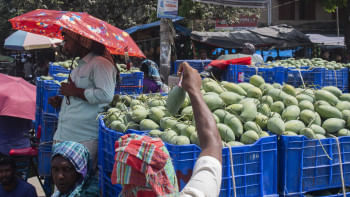What kind of a rinky-dink democracy is this?

, "My usual election-cycle comment is that we're trying to find enough duct tape to cover the holes in the bucket. This time, we're trying to make the bucket out of duct tape."
– Justin Levitt, a professor at Loyola Law School and voting-rights expert, quoted in Rolling Stone magazine.
Americans elect their president through a crazy-quilt mosaic of elections conducted by a bewildering variety of local jurisdictions spread out over the entire country, and its wheels may come off come November.
As in everything else in America, money talks. That means if you're affluent, the system usually works fine. If you are poor, tough luck, buddy. Scenes of voters in metropolitan areas waiting long hours to vote are a disgrace. Not coincidentally, a disproportionate number of them are African American.
The system is also antiquated.
Presidential elections are held on the first Tuesday after November 1 every four years. Tuesday? Comedian Chris Rock once remarked irreverently: "They don't want you to vote. If they did, we wouldn't vote on a Tuesday. In November. You ever throw a party on a Tuesday? No. Because nobody would come."
Unlike any Western democracy (and many non-Western ones), the US does not have a nationwide election system. Political scientist and elections expert Richard L. Hasen told the Brennan Center for Justice that the US needs a national non-partisan election administration similar to other advanced democracies like Australia, the UK, Canada, and Germany.
Professionals run those elections, voting machines are the same everywhere instead of partisans running elections "in 9,000 different electoral jurisdictions, each making their own rules," he said.
The ugly underbelly of the US election system was exposed to an aghast world during the 2000 presidential elections in Florida. Republican candidate George W. Bush and Democratic candidate Al Gore were separated by such a thin margin that the lead turned on how election officials chose to count questionable ballots. A bemused public was introduced to the esoteric pleasures of "hanging chads" and "pregnant chads," total bedlam ensued, and ultimately the US Supreme Court stopped the count and handed Bush the victory.
Take a more recent example. In the 2018 gubernatorial elections in Georgia. Gov. Brian Kemp narrowly beat Democratic candidate Stacey Abrams. Now take a wild guess at who was in charge of that election. It was the very same Brian Kemp.
As secretary of state, Kemp was in charge of ensuring free and fair elections where he himself was running for governor. This is the sort of Kafkaesque situation that would make even a banana republic despot blush.
It should come as no surprise that allegations of shenanigans flew thick and fast. In July 2017, Kemp's office purged 560,000 voters from the voting list in the largest single removal of voters in US history. "More than 87,000… voters have re-registered… indicating that they were eligible all along," according to the Atlanta Journal-Constitution.
Here we are, conducting an exercise every four years to elect the most powerful man in the world.
Free, clean elections are the cornerstone of legitimacy. Yet there is no central authority, no permanently employed technocrats and officials. Come election day, it's amateur hour. "Most US poll workers are elderly volunteers—the Center for Public Integrity found… that more than half in the last presidential election were 61 or older," Garrett M. Graff reported in Politico.
They are ill-suited to handle the technological challenges. After the 2000 Florida debacle, many states moved to paperless systems. However, after Russian attacks in the 2016 elections, elections authorities are bringing back systems with a paper trail.
According to a Politico survey, 14 states are upgrading systems following the 2016 election. "Millions of voters and poll workers will face new machines come Election Day," Graff reported.
It gets scarier. There are new twin perils. One is natural—the coronavirus. The other, perhaps even more dangerous, is man-made, the man in consideration being a.k.a. Donald Trump.
Coronavirus has turned American elections upside down. Officials face a logistics nightmare as elderly volunteer poll workers look likely to desert en masse. Huge swathes of voters are wary about voting in person. Many states are shifting to vote by mail. However, shifting to vote by mail has a steep learning curve.
Politico's Garrett M. Graff offers a grim summation of the upcoming elections: "Taken together, experts are anticipating an election in which it's harder to vote, harder to count the votes, less clear who's won, and more unpredictable than any election Americans have lived through. And that's if everything goes smoothly."
Straddling all of this is the biggest loose cannon of all, the president of these United States. Trump's latest pet peeve is vote-by-mail, which he claims—with no evidence as usual—is open to fraud.
"When it comes to voting rights in our pandemic election year, President Donald Trump has a habit of saying the quiet part out loud," Rolling Stone magazine said in a tongue-in-cheek report. Trump has spoken openly of gutting funding for the US Postal Service.
A scary scenario that is especially likely come Election Day is similar to what happened in the 2018 elections, when candidates led on election day but ultimately lost as mailed votes were counted.
Elections analyst Ronald Brownstein tweeted a finding from a Marquette Law poll: "Among those who say they will vote by mail, 81 percent support Biden, 14 percent Trump. Among those who will vote on election day, 67 percent support Trump, 26 percent Biden."
Trump could lead on Election Day, but as mailed votes are counted over the week, the tide could turn.
Will Trump follow the finest traditions of American democracy and concede with grace, humility and dignity like Democratic candidate John Kerry, Republican candidates Mitt Romney or John McCain did?
I'm not holding my breath.
Ashfaque Swapan is a contributing editor for Siliconeer, a digital daily for South Asians in the United States.

 For all latest news, follow The Daily Star's Google News channel.
For all latest news, follow The Daily Star's Google News channel. 



Comments